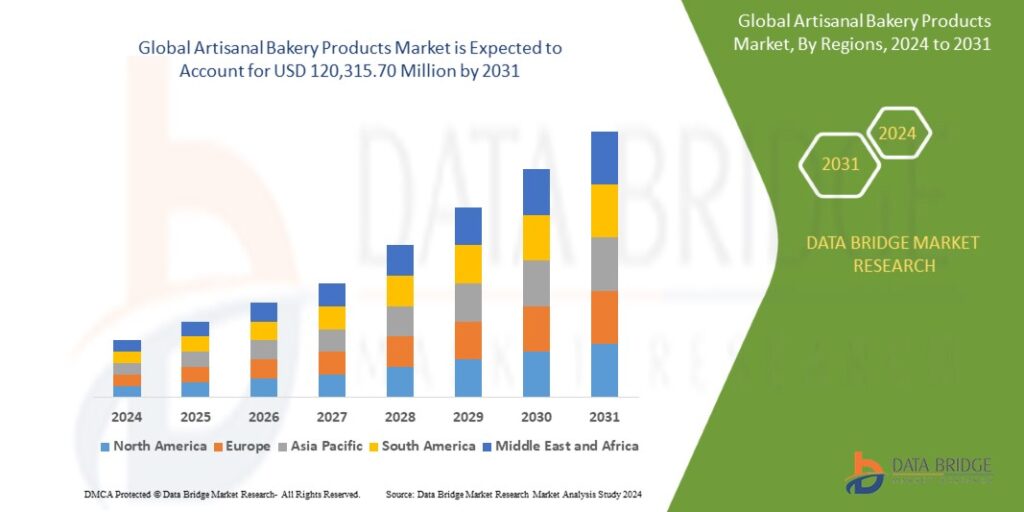Introduction
Artisanal bakery products represent a growing segment of the global bakery industry, defined by their high-quality ingredients, handcrafted preparation methods, and authentic flavors. Unlike mass-produced goods, artisanal baked products focus on freshness, natural ingredients, and unique recipes that often carry cultural or regional heritage. In today’s health-conscious and experience-driven consumer landscape, artisanal bakery products have gained significant popularity. Consumers increasingly seek authenticity, premium quality, and transparency in the foods they consume, creating fertile ground for the growth of this market.
Source – https://www.databridgemarketresearch.com/reports/global-artisanal-bakery-products-market
Market Overview
The global artisanal bakery products market is experiencing consistent growth as consumers prioritize healthier and fresher alternatives over packaged, industrially produced baked goods. Bread, cakes, pastries, and cookies crafted by artisanal bakers are often positioned as premium offerings, sold in specialty stores, cafes, supermarkets, and online platforms.
The market is projected to grow steadily in the coming years due to evolving consumer preferences, expanding urban populations, and rising disposable incomes. Europe and North America currently dominate the artisanal bakery market, but regions such as Asia-Pacific and the Middle East are witnessing rapid growth as well.
Key Market Drivers
-
Consumer Preference for Freshness
Shoppers are increasingly drawn to freshly baked goods that offer better taste, texture, and aroma compared to mass-produced alternatives. -
Health and Wellness Trends
Demand is rising for bakery products made with natural, organic, and whole-grain ingredients, often free from artificial additives and preservatives. -
Premiumization of Food
Artisanal bakery items are positioned as luxury or indulgent products, aligning with consumer willingness to spend more on quality. -
Cultural and Regional Appeal
Consumers are attracted to unique recipes inspired by cultural traditions and local heritage, adding authenticity to artisanal offerings. -
E-commerce Growth
Online delivery platforms are making artisanal bakery products more accessible, particularly in urban areas.
Market Challenges
-
High Production Costs: Artisanal products are labor-intensive and rely on premium ingredients, making them more expensive than mass-produced bakery goods.
-
Short Shelf Life: Fresh products typically have limited storage time, which can restrict large-scale distribution.
-
Competition from Industrial Bakeries: Large manufacturers are attempting to replicate artisanal styles with “artisan-inspired” lines, creating competition.
-
Scalability Issues: Maintaining quality while expanding production remains a challenge for small artisanal bakeries.
Market Segmentation
-
By Product Type: Bread, cakes, pastries, cookies, and specialty products.
-
By Distribution Channel: Specialty bakeries, supermarkets, hypermarkets, cafes, restaurants, and online platforms.
-
By Region:
-
Europe: Leading market due to strong bakery traditions and consumer preference for fresh bread and pastries.
-
North America: Growing interest in organic, gluten-free, and innovative artisanal bakery products.
-
Asia-Pacific: Rapidly expanding market driven by urbanization, rising incomes, and café culture.
-
Middle East & Africa: Growth supported by demand for premium and international bakery offerings.
-
Competitive Landscape
The artisanal bakery products market features both independent small bakeries and larger companies expanding into artisanal-style products. Independent bakeries focus on handcrafted goods and local markets, while established bakery brands invest in innovation and collaborations to attract artisanal-seeking consumers.
Some key players in the industry include specialty bakeries, local café chains, and premium food retailers that emphasize unique recipes, natural ingredients, and sustainable sourcing practices.
Future Outlook
The future of the artisanal bakery products market looks highly promising. Innovations in packaging, logistics, and e-commerce will help address challenges related to shelf life and distribution. Consumer demand for gluten-free, vegan, and functional bakery products (enriched with nutrients) is expected to create new opportunities for growth. Additionally, sustainable practices such as eco-friendly packaging and ethical sourcing of ingredients will further enhance the appeal of artisanal bakery brands.
Conclusion
The artisanal bakery products market reflects a broader trend in the food industry where consumers seek authenticity, quality, and experience over convenience alone. While challenges like higher costs and competition remain, the sector is poised for steady growth as it taps into consumer demand for healthier, fresher, and premium baked goods. With ongoing innovation and cultural significance, artisanal bakery products are set to remain a vital and evolving part of the global food landscape.

